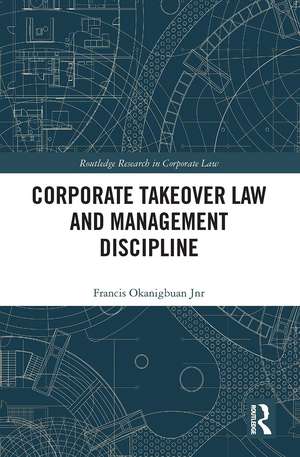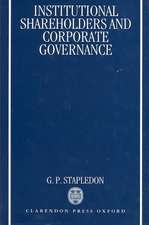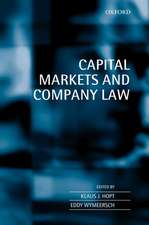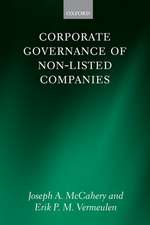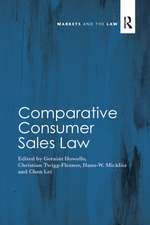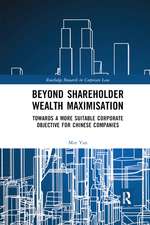Corporate Takeover Law and Management Discipline: Routledge Research in Corporate Law
Autor Francis Okanigbuan Jnren Limba Engleză Paperback – 13 dec 2021
The dominant ideologies of corporate takeovers include synergistic gains and its managerial disciplinary role. These dominant themes are being undermined by the challenges of costly acquisitions. The UK Takeover Code is a regulatory response to the role of managers of target companies only. Also, the regulatory framework for takeovers in the United States is largely focused on target companies. The book demonstrates that managements can influence the role of takeovers, thereby undermining its synergistic and disciplinary values. Presenting an identification and evaluation of the limits of current regulatory and judicial control over the role of management during takeovers in the UK and the US -Delaware, it will identify the relevance of institutional control as an effective mechanism for addressing the challenges of managerial influence over takeover functions. It will also identify how the role of managements can be addressed with the complementary benefit to shareholder and employee interests; thereby challenging the shareholder/ stakeholder primacy debate in corporate law, particularly in relation to takeovers.
This book will be essential reading for scholars and students interested in the market for corporate control, corporate law and company law.
| Toate formatele și edițiile | Preț | Express |
|---|---|---|
| Paperback (1) | 384.09 lei 6-8 săpt. | |
| Taylor & Francis – 13 dec 2021 | 384.09 lei 6-8 săpt. | |
| Hardback (1) | 1000.27 lei 6-8 săpt. | |
| Taylor & Francis – 3 mar 2020 | 1000.27 lei 6-8 săpt. |
Din seria Routledge Research in Corporate Law
- 9%
 Preț: 934.94 lei
Preț: 934.94 lei -
 Preț: 326.49 lei
Preț: 326.49 lei - 9%
 Preț: 934.94 lei
Preț: 934.94 lei - 9%
 Preț: 936.55 lei
Preț: 936.55 lei -
 Preț: 449.41 lei
Preț: 449.41 lei -
 Preț: 416.22 lei
Preț: 416.22 lei - 18%
 Preț: 1000.27 lei
Preț: 1000.27 lei - 17%
 Preț: 259.98 lei
Preț: 259.98 lei - 17%
 Preț: 247.40 lei
Preț: 247.40 lei - 12%
 Preț: 312.43 lei
Preț: 312.43 lei - 18%
 Preț: 1005.80 lei
Preț: 1005.80 lei - 12%
 Preț: 299.45 lei
Preț: 299.45 lei -
 Preț: 281.63 lei
Preț: 281.63 lei - 18%
 Preț: 1000.27 lei
Preț: 1000.27 lei - 17%
 Preț: 272.43 lei
Preț: 272.43 lei -
 Preț: 407.78 lei
Preț: 407.78 lei -
 Preț: 387.38 lei
Preț: 387.38 lei -
 Preț: 373.59 lei
Preț: 373.59 lei -
 Preț: 486.42 lei
Preț: 486.42 lei - 9%
 Preț: 935.73 lei
Preț: 935.73 lei -
 Preț: 382.54 lei
Preț: 382.54 lei -
 Preț: 448.28 lei
Preț: 448.28 lei -
 Preț: 415.24 lei
Preț: 415.24 lei -
 Preț: 425.86 lei
Preț: 425.86 lei - 18%
 Preț: 1167.58 lei
Preț: 1167.58 lei - 18%
 Preț: 1000.27 lei
Preț: 1000.27 lei -
 Preț: 389.38 lei
Preț: 389.38 lei -
 Preț: 389.38 lei
Preț: 389.38 lei - 15%
 Preț: 462.69 lei
Preț: 462.69 lei - 17%
 Preț: 259.98 lei
Preț: 259.98 lei - 18%
 Preț: 896.89 lei
Preț: 896.89 lei - 18%
 Preț: 1058.38 lei
Preț: 1058.38 lei
Preț: 384.09 lei
Nou
Puncte Express: 576
Preț estimativ în valută:
73.51€ • 75.76$ • 62.06£
73.51€ • 75.76$ • 62.06£
Carte tipărită la comandă
Livrare economică 04-18 martie
Preluare comenzi: 021 569.72.76
Specificații
ISBN-13: 9781032238258
ISBN-10: 1032238259
Pagini: 218
Dimensiuni: 156 x 234 x 12 mm
Greutate: 0.32 kg
Ediția:1
Editura: Taylor & Francis
Colecția Routledge
Seria Routledge Research in Corporate Law
Locul publicării:Oxford, United Kingdom
ISBN-10: 1032238259
Pagini: 218
Dimensiuni: 156 x 234 x 12 mm
Greutate: 0.32 kg
Ediția:1
Editura: Taylor & Francis
Colecția Routledge
Seria Routledge Research in Corporate Law
Locul publicării:Oxford, United Kingdom
Public țintă
PostgraduateCuprins
TABLE OF CONTENTS
Part I
CHAPTER ONE
GENERAL INTRODUCTION
Abstract
1.1 Introduction
1.2 The Persistent Challenges of Corporate Acquisition
1.3 Theoretical Perspectives of Takeovers
1.4 Aim and Scope
1.5 Outline
CHAPTER TWO
THE REGULATORY FRAMEWORK OF INSTITUTIONS
Abstract
2.1 Introduction
2.2 The Neo-classical Economics and the Old Institutional Economics Theories
2.3 The Framework of the New Institutional Economics
2.4 Institutions: Levels of Development and Change
2.5 Main Streams in Economics of Institutions
2.5.1 Property Rights of Shareholders
2.5.2 Transaction Costs Economics (Costs of Takeovers)
2.5.3 Agency Relationship between Managements and shareholders
2.6 How Institutions Can Influence Market Discipline
2.7 Conclusion
CHAPTER THREE
THE THEORETICAL FRAMEWORK OF CORPORATE TAKEOVERS
Abstract
3.1 Introduction
3.2 Types of Corporate Takeover: Nature and Characteristics
3.3 The Takeover Devices
3.3.1 Direct Purchase of Shares (tender offer or open market bid)
3.3.2 Proxy Contests
3.4 The Takeover Hypotheses and Justification for Takeovers
3.4.1 The Disciplinary Hypothesis
3.4.2 The Synergy Hypothesis
3.4.3 The Hubris Hypothesis
3.5 Takeover Defences
3.6 Contractual Relationships: Agency Conflicts and Employment Issues
3.6.1 Agency conflicts
3.6.2 Employment Issues
3.6.3 The Contractual Theory of the Corporation
3.6.4 The Entity Theory of the Corporation
3.7 Conclusion
Part 11
CHAPTER FOUR
TAKEOVER REGULATION IN THE UNITED KINGDOM
Abstract
4.1 Introduction
4.2 The Historical Development of Takeover Regulation in the United Kingdom
4.3 Shareholder Protection
4.3.1 Shareholders of Target Companies
4.3.2 Shareholders of Acquiring Companies
(i) Are Shareholders of Acquiring Companies Protected from Opportunistic Behaviour of Management?
(ii) Do Shareholders of Acquiring Companies Always Record Gains From Takeovers?
(iii) Derivative Action and Personal Actions by Shareholders of Acquiring Companies
4.4 Employment Protection
4.4.1 The Transfer of Undertakings (Protection of Employment) Regulations (TUPE)
4.5 Conclusion
CHAPTER FIVE
THE REGULATORY FRAMEWORK FOR TAKEOVERS IN THE
UNITED STATES (DELAWARE)
Abstract
5.1 Introduction
5.2 The Historical Development of Takeover Regulation
5.3 Shareholders of Target Companies
5.3.1 The Williams Act of 1968
5.3.2. Target Shareholder Protection in Delaware
a) Unocal Corp v Mesa Petroleum Company
b. Revlon Inc v MacAndrews & Forbes Holdings Inc.
5.4 Shareholders of Acquiring Companies
5.4.1 Managerial Conflict of Interests
a) Market power
b) Competition among bidders
c) Managerial Hubris – Corporate Size
5.5 Costly Acquisitions and Employee Dismissal
5.6 Conclusion
CHAPTER SIX
MANAGEMENT BOARD: CORPORATE GOVERNANCE AND THE MARKET FOR CORPORATE CONTROL
Abstract
6.1 Introduction
6.2 Managements Boards and Corporate Governance Administration
6.2.1 Corporate Governance in the United Kingdom
6.2.2 Corporate Governance in the United States
6.3 The Role of Managers in Corporate Acquisitions
6.3.1 Managements of Target Companies
6.3.2 Managements of Acquiring Companies
6.4 Conclusion
Part 111
CHAPTER SEVEN
COMPLEMENTARY INTERESTS OF SHAREHOLDERS AND EMPLOYEES
7.1 Introduction
7.2 Limitations to Employment Protection in Takeovers
(a) Employees as Non-financial Stakeholders
(b) Shareholder Value Approach to Corporate Regulation
7.3 Default Beneficiaries of Corporate Acquisitions
7.3.1 Shareholders in Target Companies
7.3.2 Management Board
7.3.3 Creditors
7.4 Costs of Acquisitions and the Role of Managements
7.5 A New Paradigm for Employment Protection and Shareholder Interests
7.6 Conclusion
CHAPTER EIGHT
JUDICIAL INTERVENTION IN CORPORATE ACQUISITIONS
8.1 Introduction
8.2 Case Search Methodology
8.3 Shareholder Litigations in the United Kingdom
8.4 Judicial intervention in Delaware
8.4.1 Shareholder Application Denied
8.4.2 Successful Shareholder Application
8.5 Conclusion
CHAPTER NINE
A NEW PARADIGM FOR TAKEOVER ADMINISTRATION
Abstract
9.1 Introduction
9.2 The Dominant Role of Managements in Takeovers
9.3 Professionalising Managerial Decisions and Enhancing Market Functions
Part I
CHAPTER ONE
GENERAL INTRODUCTION
Abstract
1.1 Introduction
1.2 The Persistent Challenges of Corporate Acquisition
1.3 Theoretical Perspectives of Takeovers
1.4 Aim and Scope
1.5 Outline
CHAPTER TWO
THE REGULATORY FRAMEWORK OF INSTITUTIONS
Abstract
2.1 Introduction
2.2 The Neo-classical Economics and the Old Institutional Economics Theories
2.3 The Framework of the New Institutional Economics
2.4 Institutions: Levels of Development and Change
2.5 Main Streams in Economics of Institutions
2.5.1 Property Rights of Shareholders
2.5.2 Transaction Costs Economics (Costs of Takeovers)
2.5.3 Agency Relationship between Managements and shareholders
2.6 How Institutions Can Influence Market Discipline
2.7 Conclusion
CHAPTER THREE
THE THEORETICAL FRAMEWORK OF CORPORATE TAKEOVERS
Abstract
3.1 Introduction
3.2 Types of Corporate Takeover: Nature and Characteristics
3.3 The Takeover Devices
3.3.1 Direct Purchase of Shares (tender offer or open market bid)
3.3.2 Proxy Contests
3.4 The Takeover Hypotheses and Justification for Takeovers
3.4.1 The Disciplinary Hypothesis
3.4.2 The Synergy Hypothesis
3.4.3 The Hubris Hypothesis
3.5 Takeover Defences
3.6 Contractual Relationships: Agency Conflicts and Employment Issues
3.6.1 Agency conflicts
3.6.2 Employment Issues
3.6.3 The Contractual Theory of the Corporation
3.6.4 The Entity Theory of the Corporation
3.7 Conclusion
Part 11
CHAPTER FOUR
TAKEOVER REGULATION IN THE UNITED KINGDOM
Abstract
4.1 Introduction
4.2 The Historical Development of Takeover Regulation in the United Kingdom
4.3 Shareholder Protection
4.3.1 Shareholders of Target Companies
4.3.2 Shareholders of Acquiring Companies
(i) Are Shareholders of Acquiring Companies Protected from Opportunistic Behaviour of Management?
(ii) Do Shareholders of Acquiring Companies Always Record Gains From Takeovers?
(iii) Derivative Action and Personal Actions by Shareholders of Acquiring Companies
4.4 Employment Protection
4.4.1 The Transfer of Undertakings (Protection of Employment) Regulations (TUPE)
4.5 Conclusion
CHAPTER FIVE
THE REGULATORY FRAMEWORK FOR TAKEOVERS IN THE
UNITED STATES (DELAWARE)
Abstract
5.1 Introduction
5.2 The Historical Development of Takeover Regulation
5.3 Shareholders of Target Companies
5.3.1 The Williams Act of 1968
5.3.2. Target Shareholder Protection in Delaware
a) Unocal Corp v Mesa Petroleum Company
b. Revlon Inc v MacAndrews & Forbes Holdings Inc.
5.4 Shareholders of Acquiring Companies
5.4.1 Managerial Conflict of Interests
a) Market power
b) Competition among bidders
c) Managerial Hubris – Corporate Size
5.5 Costly Acquisitions and Employee Dismissal
5.6 Conclusion
CHAPTER SIX
MANAGEMENT BOARD: CORPORATE GOVERNANCE AND THE MARKET FOR CORPORATE CONTROL
Abstract
6.1 Introduction
6.2 Managements Boards and Corporate Governance Administration
6.2.1 Corporate Governance in the United Kingdom
6.2.2 Corporate Governance in the United States
6.3 The Role of Managers in Corporate Acquisitions
6.3.1 Managements of Target Companies
6.3.2 Managements of Acquiring Companies
6.4 Conclusion
Part 111
CHAPTER SEVEN
COMPLEMENTARY INTERESTS OF SHAREHOLDERS AND EMPLOYEES
7.1 Introduction
7.2 Limitations to Employment Protection in Takeovers
(a) Employees as Non-financial Stakeholders
(b) Shareholder Value Approach to Corporate Regulation
7.3 Default Beneficiaries of Corporate Acquisitions
7.3.1 Shareholders in Target Companies
7.3.2 Management Board
7.3.3 Creditors
7.4 Costs of Acquisitions and the Role of Managements
7.5 A New Paradigm for Employment Protection and Shareholder Interests
7.6 Conclusion
CHAPTER EIGHT
JUDICIAL INTERVENTION IN CORPORATE ACQUISITIONS
8.1 Introduction
8.2 Case Search Methodology
8.3 Shareholder Litigations in the United Kingdom
8.4 Judicial intervention in Delaware
8.4.1 Shareholder Application Denied
8.4.2 Successful Shareholder Application
8.5 Conclusion
CHAPTER NINE
A NEW PARADIGM FOR TAKEOVER ADMINISTRATION
Abstract
9.1 Introduction
9.2 The Dominant Role of Managements in Takeovers
9.3 Professionalising Managerial Decisions and Enhancing Market Functions
Notă biografică
Dr Francis Okanigbuan Jnr is a Lecturer in the School of Law, Liverpool John Moores University. He was a Post-doctoral Research Fellow on the Arts and Humanities Research Council funded project; ‘Business Judgment and the Courts’ in the Centre for Business Law and Practice, School of Law, University of Leeds. He was a Teaching Assistant at the University of Manchester and Tutor at the Manchester Metropolitan University. He is a graduate-member of the Institute of Chartered Secretaries and Administrators. His research interests include; takeovers (the market for corporate control), corporate law, corporate governance, law and economics of regulation and comparative law.
Descriere
This book examines the effectiveness of corporate takeovers.
